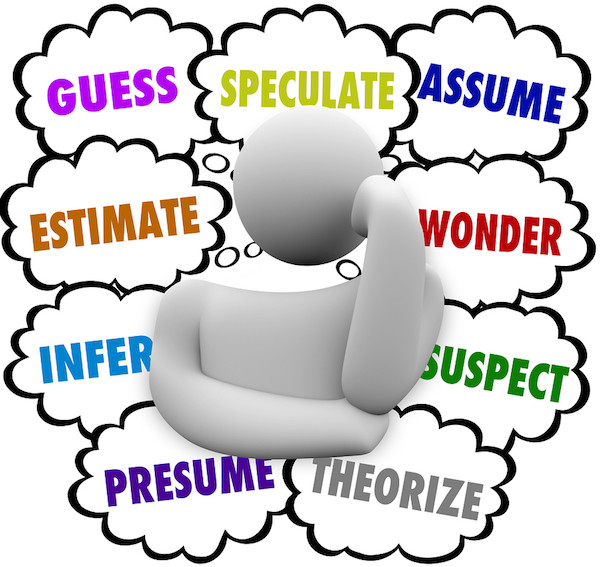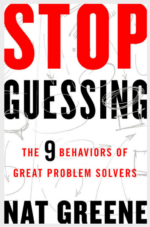 Guest Post by Nat Greene
Guest Post by Nat Greene
Humans have done a good enough job solving problems throughout the ages–otherwise we would not have made it to 7 billion people on the planet. Bravo.
But countless problems still plague humankind. Some are problems in your life, like staying healthy or managing relationships. Others are in business, which cost incalculable billions in economic loss and lots of pain for those at work. Yet others are the great societal problems at the root of human suffering: violence, poverty, and ongoing health crises. The bottom line is most of us are pretty lousy at problem solving.
What’s holding us back is how we approach problems. We guess at them. Sometimes we add structure to this guessing, like brainstorming. Sometimes we dress our guessing up in fancy terminology, like “producing ideas.” Sometimes we do a bit of research and then guess. But it’s all guessing. And hard problems – the really important ones – have so many possible root causes that it’s impossible to identify the true root cause through guessing.
If it’s such a lousy problem-solving strategy, then why do we use it? There are 3 big reasons.
Evolution
Guessing is a natural brain function. In our evolutionary history, humans had to quickly make decisions with very limited information. We had problems such as, “what tool should I use to deal with this saber-toothed tiger trying to separate me from my larynx?” Spending time studying your problem and finding the root cause behind your unfortunate conundrum was a behavior that natural selection quickly pruned from our family trees thousands of years ago.
Humans didn’t have the time, the tools, or the smarts to get seriously about problem-solving. So they solved problems through trial-and-error. What worked was passed down generation to generation. In fact, the tendency to do something “because that’s how it’s always been done” may have also been an evolutionary advantage: too much innovation when you’re in survival mode can lead to disaster.
Reinforcement in School
Remember grade school? What happened when a teacher asked a question? They expected people to throw up their hands and have a guess at it. And if you got it wrong? “Great try!” No problem for being wrong at your guess–on the contrary, you were rewarded for putting yourself out there and shouting whatever came to the top of your mind.
Why don’t schools teach students to investigate and dig into questions before trying to answer them? I’m not sure, but this encouragement to guess rewards the behavior in our tender young minds, and reinforces it for all our lives.
Reinforcement at Work
You might think that in a business situation, where the stakes are high, leaders would stamp out guessing as quickly as possible. They might instead insist on a rigorous problem-solving approach that gathers critical information about the problem and develops an understanding of the key drivers behind the problem before trying something out.
But in most businesses, when something breaks, leaders want action now. Spending hours staring at data or a broken machine can be seen as slow or lazy, whereas the employee that “rolls up their sleeves” and immediately tries something is seen as heroic. Trying out different ideas looks like progress. It’s not progress, but it’s much more satisfying to report up the chain that you’ve got your best people trying out all the ideas they came up with, than to tell them you’re carefully investigating the problem but… well, no, we haven’t tried to implement any solutions yet.
 A note from Jesse: I am delighted to host this guest post by Nat Greene, author of the excellent new book Stop Guessing: The 9 Behaviors of Great Problem Solvers. Nat offers a different way to understand your really hard problems and find simple, actionable solutions that work. I gleaned many insights from this excellent book and heartily recommend it!
A note from Jesse: I am delighted to host this guest post by Nat Greene, author of the excellent new book Stop Guessing: The 9 Behaviors of Great Problem Solvers. Nat offers a different way to understand your really hard problems and find simple, actionable solutions that work. I gleaned many insights from this excellent book and heartily recommend it!
About Nat Greene: Co-founder and CEO of Stroud International and author of Stop Guessing: The 9 Behaviors of Great Problem Solvers, Nat holds a Masters of Engineering from Oxford University and studied design, manufacturing and management at Cambridge University, in addition to executive education coursework in Harvard Business School’s Owner/President Management program.












